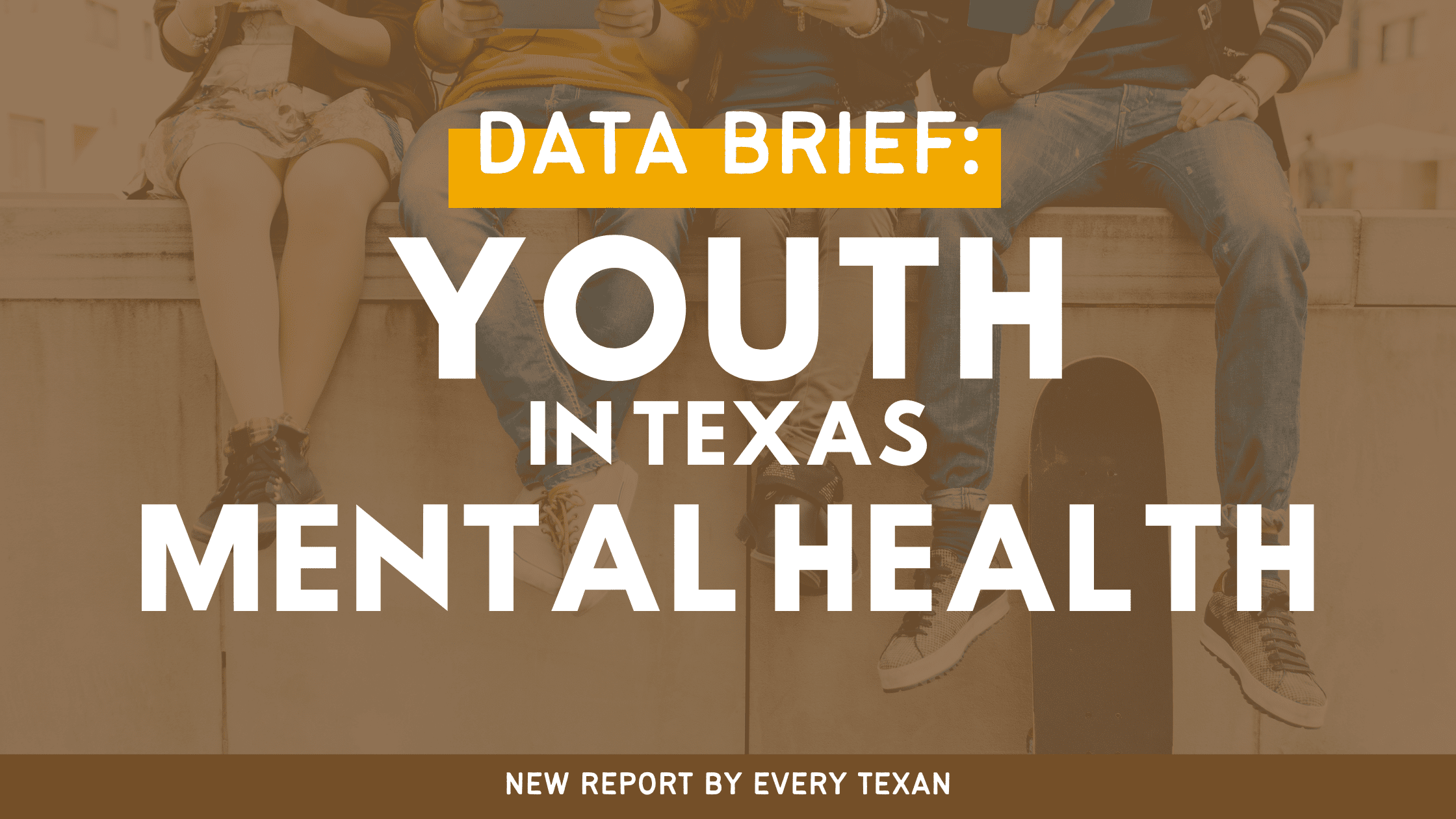View the full data brief here.
All Texans are worthy of mental health support, yet Texas adolescents and teens are particularly vulnerable to the life-threatening effects of depression and suicidal ideation. Our youth are in a state of emergency, facing stress from the COVID-19 pandemic, widespread school closures, extreme financial strain, and inflation. Not to mention, millions of Texas families are without insurance with the end of Medicaid eligibility expansion. The National Institute for Mental Health estimates that half of all mental health conditions manifest by age 14, yet youth typically wait 8-10 years before accessing care. In Texas, two-thirds of children living with major depression receive no treatment whatsoever. Early identification and intervention are critical to reducing the prevalence and severity of mental illness in young Texans.
Many Texas youth identify as having a mental, emotional, behavioral, or developmental (MEDB) problem.
Of the more than 7 million Texans ages 17 and younger, more than 1.2 million report having a mental, emotional, behavioral, or developmental (MEDB) problem. That’s 20% of all Texas youth. The definition used by the Census Bureau for its National Survey of Children’s Health includes behavioral problems, conduct problems, anxiety problems, and depression.
Texas students are increasingly at risk of depression and suicidal ideation.

The Center for Disease Control and Prevention’s (CDC) Annual Youth Risk Behavior Survey assesses students on various mental and emotional distress levels. Texas student responses show:
- 31% of students say their mental health is not good ‘most of the time’ or ‘always.’ Around 60% of these students identify as LGBTQ+.
- 47% of students reported feeling sad or hopeless almost every day for two or more weeks in a row and stopped their usual activity. The highest prevalence was among Asian (40%) and Hispanic students (31%).
- 22% of students seriously considered attempting suicide within the past year.
- 20% of students say they made a plan on how they would commit suicide in the previous year. The highest prevalence (21%) was among Black and Hispanic students.
- Only 13% of students reported reaching out to someone for help prior to a suicide attempt, whether it be a doctor, counselor, parent, or another support. Black students are the least likely to reach out for help.
- 12% of Texas students attempted suicide at least once within the last year. Black (14%) and Hispanic students (13%) are the most likely to report attempting suicide, while LGBTQ+ youth are three times more likely to report suicide attempts than heterosexual students.
These data not only spotlight a mental health crisis developing among our state’s youth but also defend the need for urgent expansion of education and health care so mental health screenings and treatments can become a priority.
Texas underperforms in providing adequate access to mental health care and coverage.
The quick-and-fast termination of expanded Medicaid eligibility during the pandemic left millions of Texans uninsured and unable to afford coverage alternatives. While state leaders fail to expand eligibility, our youth continue to suffer. Texas youth are more than twice as likely to be uninsured compared to other American children. Medicaid is one of few programs that includes mental health coverage for its recipients, many of whom are poor women and children. Yet, the fundamental right to health care remains a privilege only for those who can afford it.
The evidence-based Collaborative Care Model is gaining support as a way to expand mental health care and early identification for youth. This model combines mental and physical care under primary care, which means families can access mental health care through primary care providers, rather than seek help elsewhere at an additional expense. With Texas already facing a shortage of mental health professionals and psychiatrists, this model could alleviate long waitlists and rejections.

Texans, call for change!
Texas youth often have to deal with unfamiliar and overwhelming thoughts, feelings, and experiences without the proper tools or support. Life-saving, quality mental health treatment and access can only be achieved through public policy.
Policy solutions that improve the mental health of Texas youth increase the likelihood of early detection and intervention and also work to normalize the different feelings and experiences adolescence brings. Panelists at Beyond ABC, an annual conference focused on improving the quality of health and life for children, say most suicides are the result of someone who does not have the coping or problem-solving skills to deal with emotional trauma. They say schools are facilitating “open, honest conversations” with kids to show that negative experiences are normal.
We urge all Texans to make their needs the main priority of Texas policymakers by keeping in regular contact with local government representatives and actively voicing the importance of data collection efforts. Survey instruments, like the CDC’s Youth Risk Behavior Survey we used to inform this brief, promote new conversations on isolating topics. They have the power to reveal that one person’s trouble may reflect an entire population’s dilemma.
During the special legislative session, some legislators added language to a school voucher bill that would significantly impact participation in the Youth Risk Behavior Survey (YRBS), among other surveys. Should this bill pass, important health and wellness data about Texas youth will be lost. We urge you to contact your representative and ask them to protect this important data. Just as the Texas students surveyed in this brief were given an opportunity to voice their struggles, protecting quality survey instruments ensures that every Texan has a chance to bring their concerns to the forefront of policy.
Unsure of who represents you? Find out at this link to join us in taking action and promoting change for every Texan: Who Represents Me? (texas.gov)
For more information on the state of Texas children and overall well-being, view Annie E. Casey Foundation’s 2023 Kids Count Interactive Data Book and explore the other areas in which you can take action to improve the lives of Texas youth.
